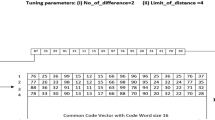Abstract
In recent years, principal component analysis (PCA) has attracted great attention in image compression. However, since the compressed image data include both the transformation matrix (the eigenvectors) and the transformed coefficients, PCA cannot produce the performance like DCT (Discrete Cosine Transform) in respect of compression ratio. In using DCT, we need only to preserve the coefficients after transformation, because the transformation matrix is universal in the sense that it can be used to compress all images. In this paper we consider to build a universal PCA by proposing a hybrid method called k-PCA. The basic idea is to construct k sets of eigenvectors for different image blocks with distinct characteristics using some training data. The k sets of eigenvectors are then used to compress all images. Vector quantization (VQ) is adopted here to split the training data space. Experimental results show that the proposed approach, although simple, is very efficient.
Access this chapter
Tax calculation will be finalised at checkout
Purchases are for personal use only
Preview
Unable to display preview. Download preview PDF.
Similar content being viewed by others
References
Linde, Y., Buzo, A., Gray, R.M.: An Algorithm for Vector Quantization. IEEE Trans. on Communications 28(1), 84–95 (1980)
Lv, C.F., Zhao, Q.: Fractal Based VQ Image Compression Algorithm. In: Proc. of the 66th National Convention of IPSJ, Japan (2004)
Lv, C.F.: IFS+VQ: A new method for Image Compression, Master Thesis, the University of Aizu, Japan (2004)
Oja, E.: A simplified neuron model as a principal component analyzer. J. Math. Biology 15, 267–273 (1982)
Carrato, S.: Neural networks for image compression. In: Neural Networks: Adv. and Appl., 2nd edn., pp. 177–198. Gelenbe Pub., North-Holland (1992)
Sanger, T.D.: Optimal unsupervised learning in a single-layer linear feedforward neural network. Neural Networks 2, 459–473 (1989)
Kung, S.Y., Diamantaras, K.I.: A neural network learning algorithm for adaptive principal component extraction (APEX). In: Proc. IEEE Int. Conf. Acoustics, Speech, and Signal Processing, Al-burqurque, NM, April 3-6, vol. 90, pp. 861–864 (1990)
Dony, R.D.: Adaptive Transform Coding of Images Using a Mixture of Principal Components. PhD thesis, McMaster University, Hamilton, Ontario, Canada (July 1995)
Author information
Authors and Affiliations
Editor information
Editors and Affiliations
Rights and permissions
Copyright information
© 2005 Springer-Verlag Berlin Heidelberg
About this paper
Cite this paper
Lv, C., Zhao, Q. (2005). A Universal PCA for Image Compression. In: Yang, L.T., Amamiya, M., Liu, Z., Guo, M., Rammig, F.J. (eds) Embedded and Ubiquitous Computing – EUC 2005. EUC 2005. Lecture Notes in Computer Science, vol 3824. Springer, Berlin, Heidelberg. https://doi.org/10.1007/11596356_90
Download citation
DOI: https://doi.org/10.1007/11596356_90
Publisher Name: Springer, Berlin, Heidelberg
Print ISBN: 978-3-540-30807-2
Online ISBN: 978-3-540-32295-5
eBook Packages: Computer ScienceComputer Science (R0)




